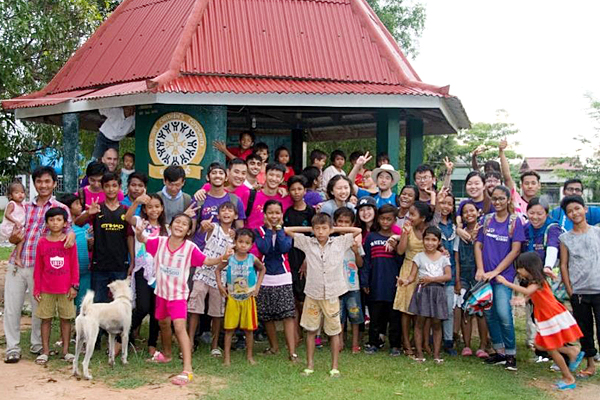Green Practices
Solar Energy Shines in Cambodia
The UST Connect service learning program leads the way in showing how a commitment to helping others and preserving our environment can generate excellent results for orphans in Cambodia.

Cambodia is a beautiful country, yet many children stay in orphanages operated by different NGOs. To utilize the natural resources and reduce the operational cost of the orphanages, a group of HKUST students from Connect service learning program had spent the last two summers there to help build a solar energy system.
Wat Opot Children Community (WOCC) is an NGO in Cambodia caring for orphans with limited resources. Electricity expense is one of their major financial burdens. The project aimed at helping them save cost by providing stable electricity and making them self-sustainable by installing the solar panels.

Starting from June 2016, a group of UST students visited WOCC in Who Wil Village to conduct a feasibility study, collect data and find out the possibilities of installing solar panels there. They measured the sunlight intensity, calculated the land area and land use and designed the installation plan.
Last summer, in collaboration with our School of Engineering, a team revisited Cambodia again to actually build a solar panel system with 60 solar panels and to educate the locals on how to operate it. One group of students completed the groundwork and built a sample slab in June and a few students worked with the technicians there to complete and document the installation. Before the trip, students had to attend workshops to learn more about solar panels and sustainable development.
When they arrived at the Wat Opot, the selected location for installing the solar panel was still a piece of grassland with some mango trees. The students were exhausted with the manual work but it meant a lot to them by contributing to the community. Students shared that when it comes to civil engineering tasks, they should trust the ability of local workers instead of teaching them how to do, and it’s important to manage the cooperation with every stakeholder and comply with the government regulation. When students with different majors came together, they learned to address different problems by considering aspects which they have never thought of before.
“My expectation was achieved. I understood more about Cambodia and the meaning of a service learning trip. I can no longer be ignorant about the outside world but explore more to consolidate my knowledge and views in the developing countries.” – Tse Man Yi (Year 4 SSCI)
“One of the reasons why I joined this trip was that I wanted to combine my knowledge in mechanical engineering with my passion for sustainable energy by working on a solar energy project that would help people.” – Ansh Nasta (Year 3 SENG/ MECH)
“This trip was one of the most satisfying and fulfilling trips I have ever had, in face of the recent climate changes and global quest for a sustainable future, I felt that the change has to start from me” – Turzo Bose (Year 2 SENG/ CEEV)
